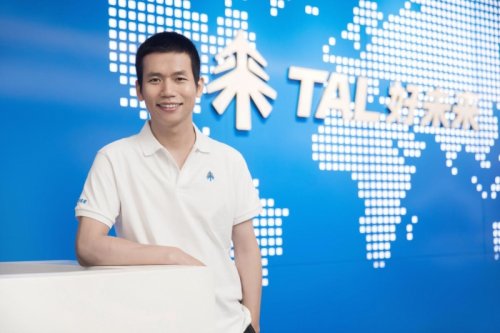Zhang Bangxin: Visionary in the Field of Education

By Lei Na
Compared with New Oriental, another Chinese education giant, Tomorrow Advancing Life (TAL) has a less dramatic, less spectacular, but more interesting growth story.
TAL’s origin dates back to 2002 when, as a way to help pay his tuition during his MD/PhD training at the School of Life Sciences at Peking University, Zhang Bangxin (EMBA 2007) worked multiple part-time jobs, including as a tutor. Under his tutorship, the average child “scored three perfect scores in three successive math tests.” Through word of mouth, the number of his students grew to 20. Remembering how upset he had been when he got his first RMB10,000 university tuition bill, he knew he had to find a way to let parents know they were making a worthwhile investment. “You’re welcome to sit in on the class. Also, you can request a refund at any time if you’re not satisfied,” he assured them. It was a commitment continued for years to come at TAL’s predecessor Xueersi.
From the early days, Zhang focused on providing a high-quality product. He divided the children into two classes, which meant double the workload but no increase in income. In his view, however, this was the only way to do a better job of teaching the children. This is also how Xueersi’s small-class-tutoring-approach was born.
With an eye on the booming tutoring market, Zhang and one of his classmates registered an after-school tutoring company. During the second semester, however, Zhang shut down two of the four teaching locations they had opened in the first semester. He was concerned that they would not be able to maintain the level of service that had become their benchmark. At the same time, he carried out a strict assessment of teachers as part of a greatly improved management system. When faced with the challenge of limited resources and a lack of connections within the industry, Xueersi turned those hurdles into an advantage by pioneering the recruitment of fresh graduates; it has since recruited teachers from 211 of the 985 universities in China. One key element in building his company is Zhang’s firm belief that “values” are no less important than capabilities. “You bring together the best people that perfectly match your values and screen out people that do not,” he said firmly. “Your values are your business model.”
In modern-day China, where many entrepreneurs are looking for opportunities and shortcuts, TAL is unique in that it has long committed itself to growth management and has never recklessly sought advancement. Their approach paid off. Xueersi became the first US-listed Chinese provider of extracurricular tutoring services for primary and secondary school students in 2010, one year after the then 30-year-old Zhang graduated with an EMBA from CEIBS.
In one widely-circulated photo of the company’s NYSE listing, Zhang was surrounded by lights and crowds. Looking back, he says he felt like an out-of-place introvert, just nodding and smiling slightly while the people around him smiled, carefree. Clearly, this was not a moment that relieved the weight from his shoulders, but a moment to gather more energy to fight the desire for expansion brought by capital.
Xueersi officially changed its name to TAL in August 2013. With a mission to “advance education through technology and the internet”, TAL shifted to a model integrating traditional and online education along with a multi-brand development strategy. After five years of exploration, TAL turned its focus from after-school to school and travelled along a path of combined public and private education. In August 2018, the Shanghai Municipal Education Commission and TAL entered into a strategic partnership to “build IT-enabled education 2.0”. At the signing ceremony, Zhang redefined TAL as an “educational technology company that complements the focus on intelligent education and open platforms with quality education and extracurricular tutorials and supports public and private education globally in the search for new educational models”.
As Amazon founder Jeff Bezos, whom Zhang admires, once said, “Long-term thinking squares the circle.” TAL’s transition is forward-looking – a combination of its insight into the reality and its thinking about the future. Perhaps, this is how TAL succeeds – by forcing itself to improve. As Zhang believes, “Doing the right thing will pay off in the long run.”
The following is an interview with Zhang Bangxin, in which he shared his many insights about future educational models, AI, and social responsibility.
 TheLINK: Why did TAL select Shanghai for the launch of its strategic cooperation into the “IT -enabled education 2.0 build-up”? What new measures will TAL introduce in this area?
TheLINK: Why did TAL select Shanghai for the launch of its strategic cooperation into the “IT -enabled education 2.0 build-up”? What new measures will TAL introduce in this area?
As a focus of educational reform in China, Shanghai has remained ahead – compared with the rest of the country – in terms of basic education. In the 2009 and 2012 Programme for International Student Assessment (PISA), Shanghai ranked No. 1 in math, reading, and science. If Shanghai makes a breakthrough in IT-enabled education, it will surely guide the country’s educational reform. Shanghai is also merging with a range of forces to make educational reform happen. It is within this context that we entered into a strategic cooperation with the Shanghai Municipal Education Commission after in-depth and extensive communication.
As part of this cooperation we will focus on intelligent education in schools and classrooms and assist the Shanghai Municipal Education Commission in practical exploration and strategy development in a push for standardised IT-enabled classroom teaching and school education.
Specifically, the two parties will conduct in-depth cooperation in two areas: 1) in capitalising on high-quality educational resources and working with Shanghai Unicom to launch a future school with the aim of “exploring potential, creating interest, guiding learning, and realising value”; and 2) in building a “brain” together, where teachers work at their best in human computing and machines work at their best in intelligent computing, to allow for a perfect combination of teachers and AI.
TheLINK: TAL has a large workforce of more than 30,000 people. How do you use internal controls to ensure a high quality of educational services? You also place a lot of emphasis on corporate values. How does having employees with shared values help you continue to drive innovation?
“Pragmatism” is one of the important values TAL has. It can be summarised as follows: 1) stronger is more important than bigger; 2) quality is more important than quantity; 3) inner is more important than outer; 4) deeds are more important than words; and 5) data is more important than experience.
As the company grows and covers more users, it can ensure long-term, steady development only by providing, as always, high-quality educational services. Otherwise, the bigger it is, the more dangerous it is going to be. So we need to control desires, start with user needs and break down ambitious ideals and goals into smaller ones in order to deliver education well.
TAL is an innovation driven company. Innovation, which is part of our values, is what makes us survive and thrive. When it comes to innovation, there are four sayings within TAL: 1) don’t fear that you can’t do it, fear only that you can’t see it (i.e. be a visionary); 2) don’t fear that you can’t see it, fear only that you can’t understand it (i.e. be modest and open-minded); 3) embrace failure in order to succeed; and 4) invest in order to have a future. We encourage internal innovation with trial-and-error and competition mechanisms. While concentrating on areas we are good at, we establish, through investment and acquisition, presence and cooperation in areas we are not that good at.
TheLINK: From your perspective, what do future educational models look like? Will online education disrupt traditional approaches to education?
The model of future education is one that combines online and offline elements, in-school and extracurricular programmes, humans and machines along with teaching and nurturing activities – none of which will disrupt the others. On one hand, traditional education needs to leverage the advantages of the internet, big data, and AI to be more technology based. On the other hand, new educational models need to learn from traditional educational models how to be more educational in nature.
Despite social progress and technological development, the nature of humans and the rules of education will remain the same. As such, I don’t think new approaches to education are opposed to traditional ones, or that new education will disrupt traditional education. Instead, in my opinion, they are interwoven and interdependent.
Currently, the internet is changing learning and AI is reshaping education. The wider application of AI and other technologies in education will make it easier to spread knowledge, freeing teachers up from troublesome and inefficient work to concentrate on education. In the near future, children will grow up with machine, artificial, and human intelligence.
TheLINK: TAL has invested in some overseas projects, including Minerva, a global “university without walls”, and Knewton, an adaptive learning platform. What shaped your decision to work with them?
Profit was not the primary consideration when we chose to invest in Minerva and Knewton. We invested in them because we see the need to combine online/offline and in-school/extracurricular activities and link China with the world for the development of education. As an open university, Minerva is exploring how to turn the entire world into a classroom by using the internet and how to foster critical thinking, creative thinking, and global citizenship in students through diversified communication. There is a lot for us to learn from this project. We hope that China can be at the forefront of global education exploration and bring in the world’s most advanced educational concepts to help more students in the country.
TheLINK: What has TAL done in terms of linking education with AI?
Essentially, “AI + education” solves the problem of “how to teach and learn better”. This will help push supply-side educational reforms in two ways. TAL will also explore AI in two areas.
First, in competency-based instruction. We want to turn the dream of individualised education into a reality by classifying and identifying students based on big data and matching each student with appropriate teachers, learning methods, and teaching resources based on their characteristics. Second, we want to provide education for all without discrimination, to replicate scarce, high-quality teacher resources on a wider scale using AI and provide more children with access to high-quality educational resources for the promotion of educational equality.
Having studied life sciences at Peking University, I know that compared with human intelligence, AI is a lower-level form of machine intelligence. The same was true of the birth of machines hundreds of years ago. Machines can empower humans because of their superiority in some respects. For example, cars run faster than humans and computers compute faster than humans. However, human intelligence is far more creative, systematic, diversified, and sophisticated. Going forward, the combination of AI and human intelligence could allow human beings to make better use of their imagination and creativity and to gain a deeper understanding of the relationship between self and world, empathy, compassion, and love, so as to elevate human civilisation to a new level.
TheLINK: Can you brief us on TAL’s vision for social responsibility?
From the donation we made to Hope primary schools in 2008 to the launch of the philanthropic educational programme “One Classroom” in 2012 to the establishment of the TAL Foundation in 2013 to the launch of online public welfare platform xiwang.com and the founder team’s contribution of RMB1 billion to an educational charity fund in 2017, our 10-year philanthropic journey has seen a transition from the donation of money and materials in the 1.0 era to the contribution of human intelligence in the 2.0 era to the use of technology and internet platforms in the 3.0 era.
Beginning in 2018, we decided to support village kindergartens with donations made to 30 kindergartens so far. In early July this year, we visited six village kindergartens in the Qixingguan district of Bijie City in Guizhou with the China Development Research Foundation. Our teachers delivered model lessons there, which were well received among the children.
Children in rural areas are not inferior to their counterparts in cities. All they lack are opportunities and resources. This has provided greater clarity on how we can support village kindergartens – making proper teaching systems for village kindergartens based on our pre-school educational system, dual-teacher model, and AI technology while providing remote mountain areas access to high-quality pre-school educational resources in order to ensure a good start for children there.
The economy promotes social development, while education accelerates it. As an educational technology company, TAL will continue to help improve educational equality with love and technology.











